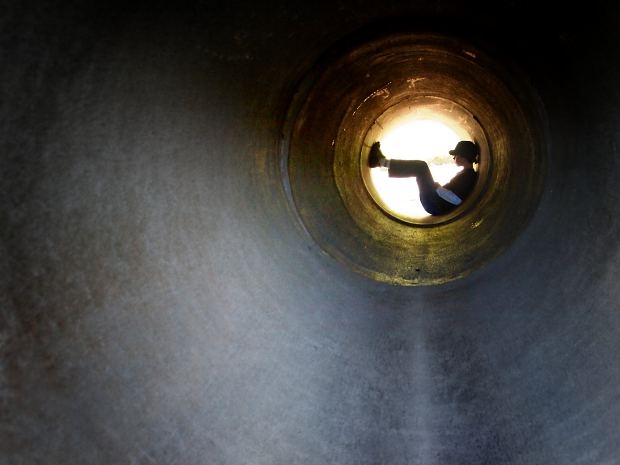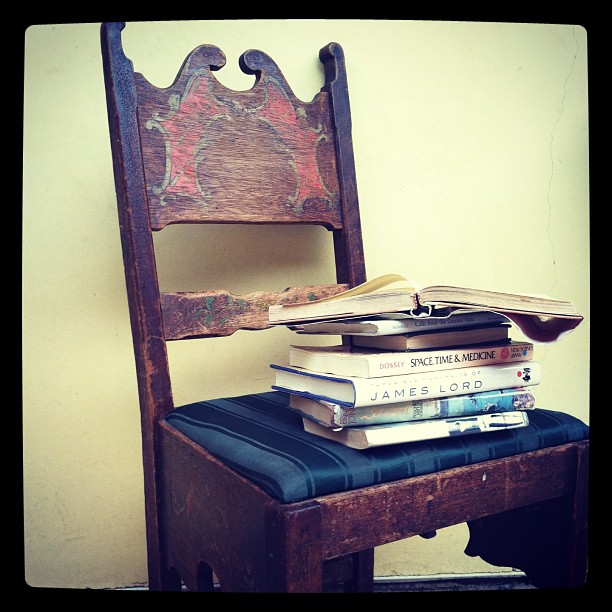
Sometimes I get mad about all the bullshit about writing. I’m not in the mood for anything fancy. I’m increasingly tired of glossy magazines showing people’s ‘creative spaces’ where it’s clear that absolutely nothing happens. My space is all about what happens there.
Virginia Woolf famously said a woman writer needs a “room of one’s own.” I politely beg to differ. I’d like to take a moment to point out the little known fact that the reason Virginia Woolf had a room of her own was because she inherited from her aunt a substantial annual income. Her ability to fund publication of her own work through her Hogarth Press may have contributed more to her literary legacy than a private room in which to write.
While it might be optimal to have a room of one’s own, not having one certainly shouldn’t serve as an excuse for not writing. Lately, at my local failing bookstore, I’ve seen entire periodicals devoted to showcasing the offices and studios of creative women. My office is notably absent from these photographs. For the last nearly two decades, I have written from a space of about two feet by two feet in the corner of our family room-kitchen. Is this ideal? No. Does it work? Apparently, yes.
My desk began its life as an IKEA diaper changing table for our second daughter. In addition to a Medusa like tangle of cords, it houses a printer/fax, phone, headset for Google phone, an old fashioned but active Rolodex from my years in the film business, a tin of broken crayons, assorted pencils and pens and a snowdrift of papers and business cards.

My office chair was a gift from my mother-in-law. It is a carved Spanish oak antique, hand painted and upholstered by moi in a dark green satin stripe. Is it beautiful? Yes. Is it comfortable? No. My desk is an ergonomic disaster. To write, I must balance the key board on my knees and lean forward to reach the mouse, putting my face perilously close to the monitor screen. And yet I have managed to write a dozen plays and countless letters, poems and essays in this space.
In fact, it was at this same pitiful desk that I composed, while sick with a flu brought home from school by the children, my short play, Warner Bros., which was recently published in Best American Short Play 2011-2012. Why would I make my writing life so difficult for myself, you might ask? Because, life is moving so fast. There is no time for niceties.
Which brings me to the second complaint I hear: I have no time to write. It’s true that we all may dream of extended hours without interruption in which to contemplate our characters and structure. However, by necessity, I have become a ‘let’s get this done’ kind of writer. No doubt, having limited time to write changes the writing itself. But, can we imagine that it might change the writing for the better? T.S. Eliot, in a 1959 interview with The Paris Review, said,
“I think that for me it's been very useful to exercise other activities, such as working in a bank, or publishing even. And I think also that the difficulty of not having as much time as I would like has given me a greater pressure of concentration. I mean it has prevented me from writing too much. The danger, as a rule, of having nothing else to do is that one might write too much rather than concentrating and perfecting smaller amounts.”
Yes, I would prefer to write alone in extended quiet. But many a piece has been composed while my son sat behind my back assembling spaceships from Lego. And while I’ve been known to yell at my kids to get out during critical writing moments, there is usually no barring them from the snack making that takes place just fifteen feet from my desk. The interruptions lead to a certain staccato. Again, not ideal, but if you are waiting for the perfect moment, I can almost assure you it will not appear.
Virginia Woolf recognized this and noted, “one would say that women’s books should be shorter, more concentrated, than those of men, and framed so that they do not need long hours of steady and uninterrupted work. For interruptions there will always be.” While I agree that interruptions are nearly inevitable, I do not agree that the length of our work should be less ambitious.
It may just take us longer to get there. Accretion may happen at a glacial pace, but it does occur. I understand what it’s like to be too busy to write. With a husband, three children, a demanding day job, a house in constant need of repair, there is rightfully no time to write. And yet I must. It’s the compulsion that keeps me going, keeps me putting it sometimes first (to the chagrin of my neighbors when they inspect my sub-par lawn while walking their dogs). But, I write.
I often return to the memory of an evening around 1986 that I spent at the San Francisco Saloon in West L.A. with writer friends. The bar is a gritty, man-ish place set on the awkward triangular corner formed by the intersections of Pico and Exposition boulevards. At the time, I was a film student at UCLA, and writer-director Neal Jimenez was a kind of elder statesman in our informal group. He had already written River’s Edge, and soon after went on to write and direct The Waterdance.
I admired him as a writer and knew that he was the real deal, while I was sure I was not. When I asked him about writing, his response was direct, forthright, “If you want to write, write.” It made it seem so obvious, so simple! There was no waiting for the perfect moment, the perfect tool, and the perfect place. And even more so, there was no waiting for permission.
No waiting to be anointed - by the professors, the industry, our parents, our friends. If you want to write, write. As a matter of survival. As a need. As if you are hacking your way out of a jungle. I often came back to his words and struggled to understand them, like a koan. In their profound freedom, I eventually became a writer. Or, more fully, I eventually gained recognition for the writer I always was.
Don’t wait for a room of your own. Don’t wait until you have the time. If you want to write, write. The rest of it is bullshit.
© Andrea Sloan Pink. All rights reserved. This work may not be reproduced without the written permission of the copyright holder.
![]() at the top of the post
at the top of the post![]() at the top of the post
at the top of the post